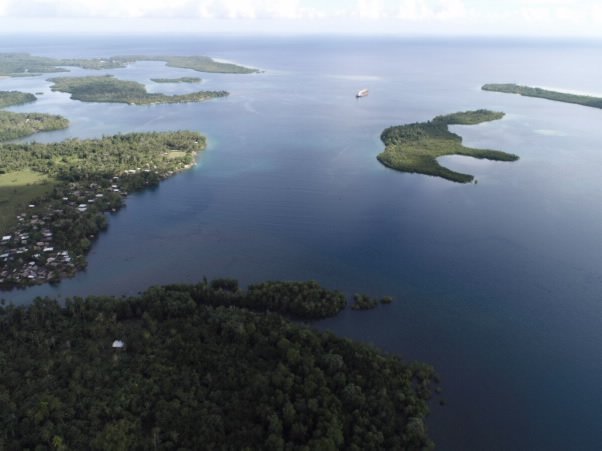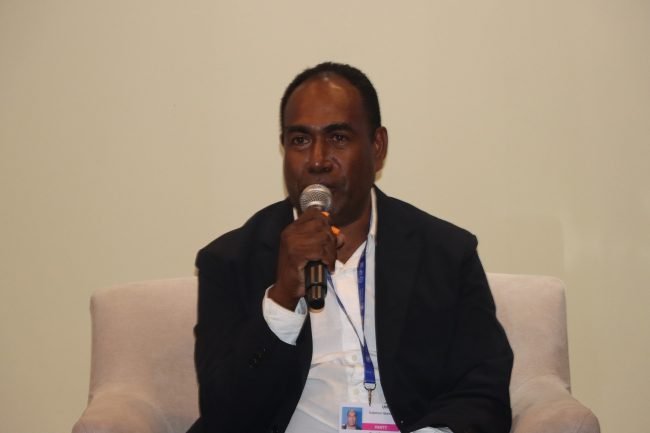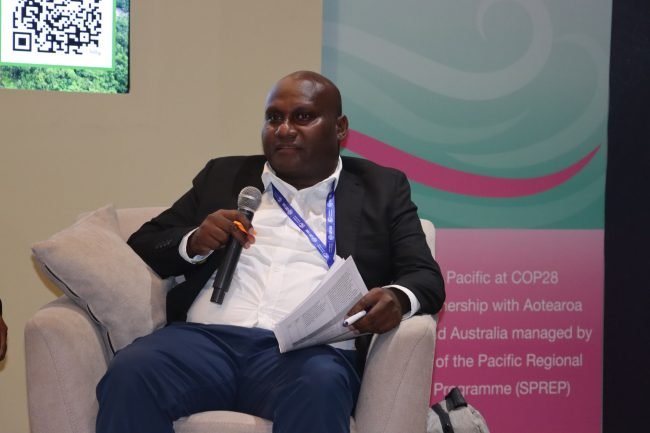
Beyond COP28 climate talks, Solomon Islands to scale-up its climate resilience
Like other small island developing states, the Solomon Islands where climate change threatens the very existence of the people and the country, adaptation is not an option, but a matter of survival. Recognizing the urgency of the situation, the country has embarked on two huge projects to scale-up energy needs and efficiency, the Tina Hydro and Bina Harbour Tuna Processing Facility in Guadalcanal and Malaita provinces.
At the sideline event of the United Nations climate change summit or the 28th Conference of Parties (COP28) in Dubai held at the Moana Blue Pacific Pavilion, the two projects were presented as the so-called enhancing intactness, is a concept adopted by Solomon Islands in line with its National Determined Contributions (NDC), hoped to bring the issue of climate change down to the community level and indigenous people.

Members of the side event panel
The two projects are developed under this concept by involving communities to seek funding in an effort to strengthen the country’s climate change adaptation, mitigation and resilience.
The Tina Hydro project when providing lower greenhouse gas emissions will also help indigenous people have access to clean electricity. It promised to reduce the cost of power supply generation by replacing diesel power with hydrogen, and reduce greenhouse gas emissions. It is estimated that the hydropower will generate 68% of Honiara’s electricity.
Deputy Project Manager of the Tina Hydro Project, Fred Conning said the project aims to deliver cheap electricity for economic development as a result of working together with the indigenous communities.
“The idea of intactness involves working with indigenous people in keeping the project sustainable and delivering mitigation against climate change,” Conning said.

Deputy Project Manager of the Tina Hydro Project, Fred Conning | Photo: SPREP
Deputy Secretary Technical for the Ministry of Fisheries and Marine Resources, James Teri said the effects of climate change could shift the country’s tuna resources to the eastern Pacific region which could also have an impact on the economy.
He said through the project, “Solomon Islands is focusing on its preparedness and making practical progress adaptation to reduce the effects of climate change on its tuna resources,” Teri said.
Accessing Finance for Climate Change Adaptation in Solomon Islands
Solomon Islands Ministry of Finance and Treasury has set up a Climate Finance Unit responsible for the administration of funding arrangements for climate change related issues.
A road map was also developed to guide the implementation of climate finance.
Director of the Ministry of Finance and Treasury Tobias Bule said the role of the ministry is to address the vulnerability of economic activities in the country.
“It is the priority of the government to deliver infrastructures…and play a pivotal role in addressing climate change,” Bule stated.

Director of the Ministry of Finance and Treasury Tobias Bule | Photo: SPREP
Deputy Secretary Technical within the Ministry of Environment, Climate Change, Disaster Management and Meteorology Chanel Iroi said the two projects are part of Solomon Islands adaptation concept and avenue to seek resources that will help address climate change.
Meanwhile the Tina Hydro project has multiple financiers with a funding arrangement of $USD 15 million from Abu Dhabi for Development, $USD 34 million from the World Bank, $USD 13 million from the Australian Government, $USD 86 million from the Green Climate Fund, $USD 32 million from Korea-EX-IM Economic Development Cooperation Fund and $USD 30 million from the Asian Development Fund.
The Bina Harbour Tuna Processing Facility as in 2022 has a funding arrangement of $NZD of 12.5 million, $USD 200,000 from the International Finance Corporation including a $USD450, 000 towards the Ministry of Fisheries and Marine Resources and $USD 140 million from the Australian government.
At COP28, Solomon Islands is pushing for more climate finance to be delivered to developing countries suffering from the impacts of climate change.
A positive outcome on climate finance would support developing countries such as Solomon Islands strengthen their climate change adaptation approaches and mitigation.
ENDS///
By Fredrick Kusu
Dubai, United Arab Emirates
This story was produced as part of the 2023 Climate Change Media Partnership fellowship organized by Internews’ Earth Journalism Network and the Stanley Center for Peace and Security
